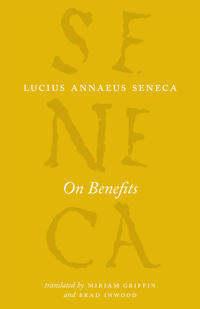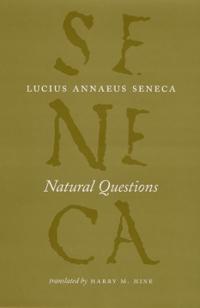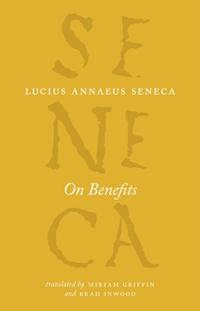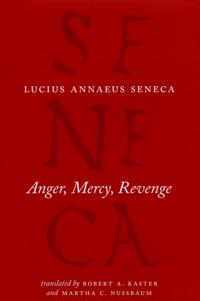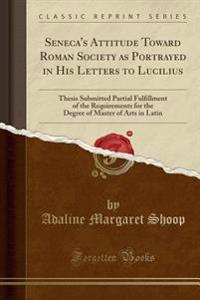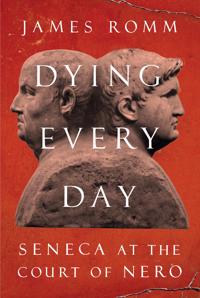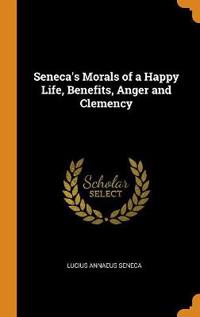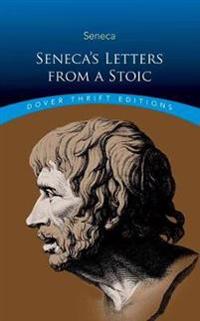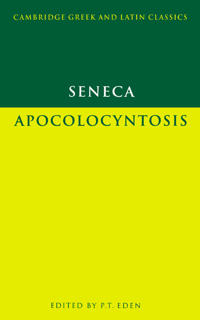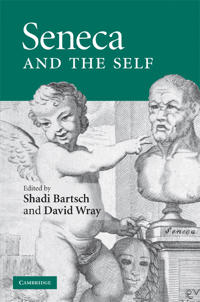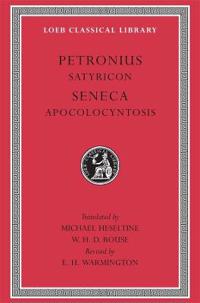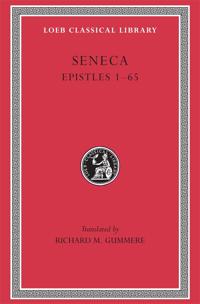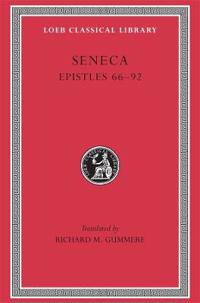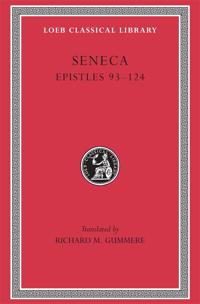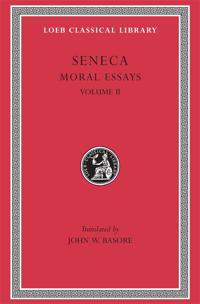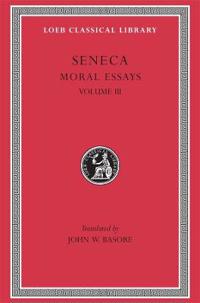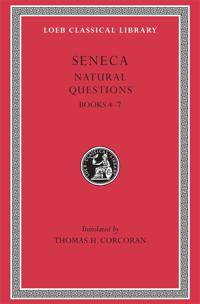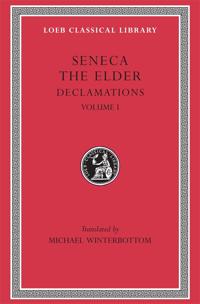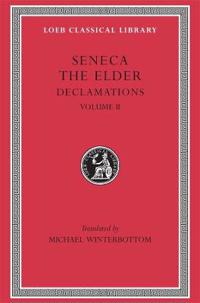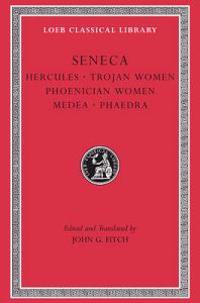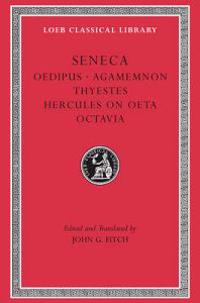On Benefits (Häftad)
avLucius Annaeus Seneca
ISBN: 9780226212227 - UTGIVEN: 2014-09Part of the Complete Works series, On Benefits, written between 56 and 64 CE, is a treatise addressed to Seneca's close friend Aebutius Liberalis. The longest of Seneca's works dealing with a single subject - how to give and receive benefits and how to express gratitude appropriately - On Benefits i[...]
Natural Questions (Inbunden)
avLucius Annaeus Seneca
ISBN: 9780226748382 - UTGIVEN: 201005Lucius Annaeus Seneca (4 BCE to 65 CE) was a Roman Stoic philosopher, dramatist, statesman, and advisor to the emperor Nero, all during the Silver Age of Latin literature. Here, with the publication of "Anger, Mercy, Revenge" and "Natural Questions", the University of Chicago Press proudly inaugurat[...]
On Benefits (Inbunden)
avLucius Annaeus Seneca
ISBN: 9780226748405 - UTGIVEN: 201104Lucius Annaeus Seneca (4 BCE - 65 CE) was a Roman Stoic philosopher, dramatist, statesman, and advisor to the emperor Nero, all during the Silver Age of Latin literature. "The Complete Works of Lucius Annaeus Seneca" is a fresh and compelling series of new English-language translations of his works [...]
Anger, Mercy, Revenge (Inbunden)
avLucius Annaeus Seneca
ISBN: 9780226748412 - UTGIVEN: 201008Lucius Annaeus Seneca (4 BCE to 65 CE) was a Roman Stoic philosopher, dramatist, statesman, and advisor to the emperor Nero, all during the Silver Age of Latin literature. Here, with the publication of "Anger, Mercy, Revenge" and "Natural Questions", the University of Chicago Press proudly inaugurat[...]
Seneca's Attitude Toward Roman Society as Portrayed in His Letters to Lucilius
ISBN: 9780259575177 - UTGIVEN: 2017-07Dying Every Day: Seneca at the Court of Nero (Inbunden)
avJames Romm
ISBN: 9780307596871 - UTGIVEN: 2014-03From acclaimed classical historian and author of "Ghost on the Throne" ("Gripping...the narrative verve of a born writer and the erudition of a scholar"-Daniel Mendelsohn) and "The Landmark Arrian" ("Thrilling"-"The New York Times Book Review")-a work of history on the grand scale: a high stakes dra[...]
Seneca's Morals of a Happy Life, Benefits, Anger and Clemency
ISBN: 9780341979142 - UTGIVEN: 2018-10Seneca (Pocket)
avPaul Veyne
ISBN: 9780415762250 - UTGIVEN: 2014-05The great stoic philosopher, playwright and Roman statesman of the first century, Lucius Annaeus Seneca, exercised enormous influence for nearly fifteen years as tutor and political advisor to the Emperor Nero until forced to commit suicide by his former pupil. In the hands of Annales School histori[...]
Seneca's Letters from a Stoic (häftad)
ISBN: 9780486811246 - UTGIVEN: 2016-12As chief advisor to the emperor Nero, Lucius Annaeus Seneca was most influential in ancient Rome as a power behind the throne. His lasting fame derives from his writings on Stoic ideology, in which philosophy is a practical form of self-improvement rather than a matter of argument or wordplay. Senec[...]
Seneca's Letters from a Stoic
ISBN: 9780486817866 - UTGIVEN: 2016-11As chief advisor to the emperor Nero, Lucius Annaeus Seneca was most influential in ancient Rome as a power behind the throne. His lasting fame derives from his writings on Stoic ideology, in which philosophy is a practical form of self-improvement rather than a matter of argument or wordplay. Senec[...]
Seneca: Apocolocyntosis (Häftad)
ISBN: 9780521288361 - UTGIVEN: 1984-03The Gourdification of Claudius the God has instant and lasting appeal. It is a uniquely surviving specimen of prose-and-verse satire from the Roman world - and satire, a Roman speciality, is one of the few types of ancient literature to survive, and thrive, in modern society. Its author, Seneca, was[...]
Seneca and the Self (Inbunden)
ISBN: 9780521888387 - UTGIVEN: 200907This new collection of essays by well-known scholars of Seneca focuses on the multifaceted ways in which Seneca, as philosopher, politician, poet and Roman senator, engaged with the question of ethical selfhood. The contributors explore the main cruces of Senecan scholarship, such as whether Seneca'[...]
Petronius (Inbunden)
avPetronius Arbiter, Seneca. Apocolocyntosis
ISBN: 9780674990166 - UTGIVEN: 1936-12Petronius (C. or T. Petronius Arbiter), who is reasonably identified with the author of this famous satyric and satiric novel, was a man of pleasure and of good literary taste who flourished in the times of Claudius (41-54 CE) and Nero (54-68). As Tacitus describes him, he used to sleep by day, and [...]
Epistulae Morales (Inbunden)
avLucius Annaeus Seneca
ISBN: 9780674990845 - UTGIVEN: 191712Seneca, Lucius Annaeus, born at Corduba (Cordova) ca. 4 BCE, of a prominent and wealthy family, spent an ailing childhood and youth at Rome in an aunt's care. He became famous in rhetoric, philosophy, money-making, and imperial service. After some disgrace during Claudius' reign he became tutor and [...]
Epistulae Morales (Inbunden)
avLucius Annaeus Seneca
ISBN: 9780674990852 - UTGIVEN: 198907Seneca, Lucius Annaeus, born at Corduba (Cordova) ca. 4 BCE, of a prominent and wealthy family, spent an ailing childhood and youth at Rome in an aunt's care. He became famous in rhetoric, philosophy, money-making, and imperial service. After some disgrace during Claudius' reign he became tutor and [...]
Epistulae Morales (Inbunden)
avLucius Annaeus Seneca
ISBN: 9780674990869 - UTGIVEN: 194312Seneca, Lucius Annaeus, born at Corduba (Cordova) ca. 4 BCE, of a prominent and wealthy family, spent an ailing childhood and youth at Rome in an aunt's care. He became famous in rhetoric, philosophy, money-making, and imperial service. After some disgrace during Claudius' reign he became tutor and [...]
Moral Essays (Inbunden)
avLucius Annaeus Seneca
ISBN: 9780674992801 - UTGIVEN: 193512Seneca, Lucius Annaeus, born at Corduba (Cordova) ca. 4 BCE, of a prominent and wealthy family, spent an ailing childhood and youth at Rome in an aunt's care. He became famous in rhetoric, philosophy, money-making, and imperial service. After some disgrace during Claudius' reign he became tutor and [...]
Moral Essays (Inbunden)
avLucius Annaeus Seneca
ISBN: 9780674993433 - UTGIVEN: 1935-12Seneca, Lucius Annaeus, born at Corduba (Cordova) ca. 4 BCE, of a prominent and wealthy family, spent an ailing childhood and youth at Rome in an aunt's care. He became famous in rhetoric, philosophy, money-making, and imperial service. After some disgrace during Claudius' reign he became tutor and [...]
Seneca (Inbunden)
avThomas H. Corcoran
ISBN: 9780674994959 - UTGIVEN: 1971-06Seneca (c. 4 65 CE) devotes most of Naturales Quaestiones to celestial phenomena. In Book 1 he discusses fires in the atmosphere; in 2, lightning and thunder; in 3, bodies of water. Seneca s method is to survey the theories of major authorities on the subject at hand, so his work is a guide to Greek[...]
Naturales Quaestiones (Inbunden)
avLucius Annaeus Seneca
ISBN: 9780674995031 - UTGIVEN: 1972-06Seneca, Lucius Annaeus, born at Corduba (Cordova) ca. 4 BCE, of a prominent and wealthy family, spent an ailing childhood and youth at Rome in an aunt's care. He became famous in rhetoric, philosophy, money-making, and imperial service. After some disgrace during Claudius' reign he became tutor and [...]
Declamations (Inbunden)
avLucius Annaeus Seneca
ISBN: 9780674995109 - UTGIVEN: 1974-06Roman secondary education aimed principally at training future lawyers and politicians. Under the late Republic and the Empire, the main instrument was an import from Greece: declamation, the making of practice speeches on imaginary subjects. There were two types of such speeches: "controversiae" on[...]
Controversiae (Inbunden)
avLucius Annaeus Seneca
ISBN: 9780674995116 - UTGIVEN: 1974-06Roman secondary education aimed principally at training future lawyers and politicians. Under the late Republic and the Empire, the main instrument was an import from Greece: declamation, the making of practice speeches on imaginary subjects. There were two types of such speeches: "controversiae" on[...]
Tragedies (Inbunden)
avLucius Annaeus Seneca
ISBN: 9780674996021 - UTGIVEN: 200206Seneca is a figure of first importance in both Roman politics and literature: a leading adviser to Nero who attempted to restrain the emperor's megalomania; a prolific moral philosopher; and the author of verse tragedies that strongly influenced Shakespeare and other Renaissance dramatists. Here is [...]
Tragedies (Inbunden)
avLucius Annaeus Seneca
ISBN: 9780674996106 - UTGIVEN: 2004-06Seneca is a figure of first importance in both Roman politics and literature: a leading adviser to Nero who attempted to restrain the emperor's megalomania; a prolific moral philosopher; and the author of verse tragedies that strongly influenced Shakespeare and other Renaissance dramatists. This vol[...]
Seneca
ISBN: 9780715631652 - UTGIVEN: 2003-01Phaedra is one of Seneca's most successful tragedies. It was the first ancient drama to be performed in the Renaissance, marking an epoch in European theatre. The myth, as reworked by Seneca on the basis of dramas by Euripides, was endowed with fresh power, and his characterisation of Phaedra, espec[...]

